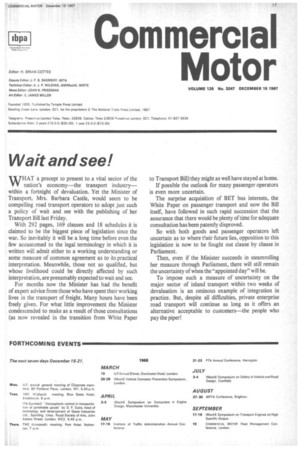Wait and see!
Page 19

If you've noticed an error in this article please click here to report it so we can fix it.
WHAT a precept to present to a vital sector of the nation's economy—the transport industry— within a fortnight of devaluation. Yet the Minister of Transport, Mrs. Barbara Castle, would seem to be compelling road transport operators to adopt just such a policy of wait and see with the publishing of her Transport Bill last Friday.
With 292 pages, 169 clauses and 18 schedules it is claimed to be the biggest piece of legislation since the war. So inevitably it will be a long time before even the few accustomed to the legal terminology in which it is written will admit either to a working understanding or some measure of common agreement as to its practical interpretation. Meanwhile, those not so qualified, but whose livelihood could be directly affected by such interpretation, are presumably expected to wait and see.
For months now the Minister has had the benefit of expert advice from those who have spent their working lives in the transport of freight. Many hours have been freely given. For what little improvement the Minister condescended to make as a result of those consultations (as now revealed in the transition from White Paper to Transport Bill) they might as well have stayed at home. If possible the outlook for many passenger operators is even more uncertain.
The surprise acquisition of BET bus interests, the White Paper on passenger transport and now the Bill itself, have followed in such rapid succession that the assurance that there would be plenty of time for adequate consultation has been patently disproved.
So with both goods and passenger operators left uncertain as to where their future lies, opposition to this legislation is now to be fought out clause by clause in Parliament.
Then, even if the Minister succeeds in steamrolling her measure through Parliament, there will still remain the uncertainty of when the "appointed day" will be.
To impose such a measure of uncertainty on the major sector of inland transport within two weeks of devaluation is an ominous example of integration in practice. But, despite all difficulties, private enterprise road transport will continue as long as it offers an alternative acceptable to customers—the people who pay the piper!












































































































